AFCON Archives Nigeria: How the Super Eagles started soaring
In this week’s AFCON Archives, the weekly deep dive into the history of Africa’s continental football tournament, we’re charting the rise of Nigeria’s Super Eagles and Super Falcons.
AFCON Archives: How defiance shaped dominance for Super Falcons
Despite long-established aspirations to be a leading football force in the continent, Nigeria only won their first Africa Cup of Nations title in 1980. To add to their woes, it was West African rivals Ghana – often referred to as the ‘tiny neighbour’ – who had taken up that mantle during the 1960s.
By 1980, The Super Eagles were taking flight. What had changed?
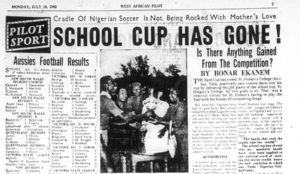
1960s: Flightless Eagles
Nigeria versus Ghana, referred to as the ‘Jollof Derby,’ is amongst the fiercest footballing rivalries on the African continent.
However, in the years before 1980, it was little more than a source of pain for Nigerians who endured repeated humiliations at the hands of their so-called ‘tiny neighbour.’
Ghana’s first president Dr Kwame Nkrumah, known as ‘Osagyefo,’ used football to promote Pan-Africanism and succeeded in his efforts to raise the standards of The Black Stars.
Ghana won back-to-back AFCON titles in 1963 and 1965, establishing their pre-eminence in the continent.
AFCON Archives 1960s: Ghana’s Black Stars do the double

For Nigeria, the 1960s are not remembered so fondly.
Dr Chuka Onwumechili is the author of Africa’s Elite Football: Structure, Politics, and Everyday Challenges and an avid Super Eagles fan.
He explains Ghana’s dominance in this period.
“Ghana dominated Nigeria, but with good reason. Even though they’re a smaller neighbour, Ghana really invested in soccer a lot earlier,” he says.
While Ghana won AFCON in 1963, The Super Eagles crashed out in the group stages.
It would be the last time they competed at AFCON until 1976, with political turmoil and sporting apathy limiting the activity of the national side.
The Nigerian public were left dissatisfied by the state’s lacklustre support for sporting progress, as shown by ‘Mr Nigeria’s’ article in the West African Pilot.
“Many of us are not happy with the degree of attention which the officials of the NFA pay to the prestige of Nigeria in the field of soccer.”
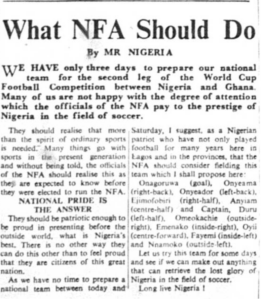
Nothing punctuated sporting deficiencies more than defeats at the hands of The Black Stars. Reporting on the 5-0 loss to Ghana in February 1963, the West African Pilot captures the despair that such results induced.
“Ghana played their National Anthem before the match and after Nigeria’s defeat, they closed the day with their own National Anthem. They spelt G-h-a-n-a over our football and spat on our flag.”
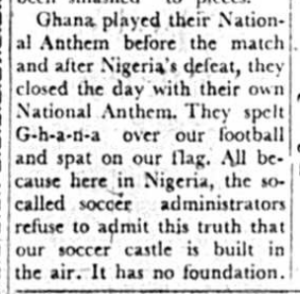
The prowess of The Black Stars only placed The Super Eagles’ struggles in sharper focus, leading to sports-based indictments of the Nigerian government.
“Ghana may have their faults, but when it comes to the question of raising the name of their country, their government comes in forcibly to help.”
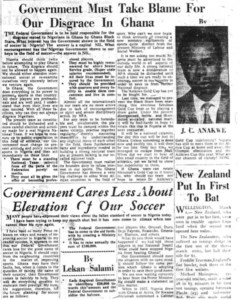
If a sporting disinterest had held Nigeria back in the 1960s, what had changed by 1980?
1970s: Fledgling Eagles
1972 was a transformative year for Nigerian football, with the establishment of the National League.
“That national league changed Nigeria’s soccer forever. It brought Nigeria to prominence because the footballers were now playing regularly,” says Dr Onwumechilli.
The National League also helped to quiet the ethno-centric ideas that had polluted Nigerian football in the previous decade.
Perhaps most crucial in this respect was the emergence of Enugu Rangers in Eastern Nigeria, which had lacked a strong team until this point and felt slighted as a result.
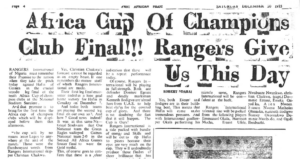
Enugu Rangers were shaped by the Nigerian Civil War(1967-70), which saw the mass exodus of Igbo peoples to Eastern Nigeria, which then seceded as the Republic of Biafra.
In the post-war period, talented players remained in the East and joined Rangers.
“After the war in 1970, a lot of the great players who were of Igbo extraction from the East were afraid of returning to their clubs in Lagos,” Dr Onwumechili explains.
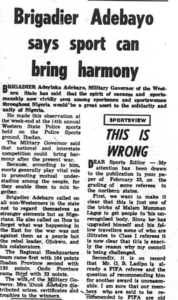
The appointment of coach Tiko Jelisavčić in 1974 offered a further boost to The Super Eagles, and the Yugoslavian led Nigeria to two third-placed AFCON finishes before his departure in 1978.
As Brazilian coach Otto Glória took the reins ahead of AFCON 1980, his Super Eagles were ready to fly.
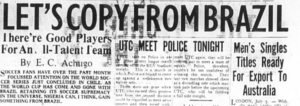
1980s: Flying Eagles
The 1980 triumph was glorious, but Nigeria’s performances at the tournament were less so.
“If you really look back at it, Nigeria did not play its best soccer. First of all, going into that tournament, we did not have a credible striker,” says Dr Onwumechili.
The recently discovered Ifeanyi Onyedika led the front-line for most of the tournament.
“He wasn’t really a great player, but he was a great goal scorer,” says Dr Onwumechili.
The Super Eagles made it out the group and then clawed their way past Morocco’s Atlas Lions in the semi-final, progressing to face a strong Algeria team in the final.
Onyedika lost his spot in the starting eleven for this decisive clash, with the electric winger Segun Odegbami moving into the centre of attack.
The adjustment proved a masterstroke. Odegbami scored two first-half goals as The Super Eagles stormed to a 3-0 win.
🗓 #OTD in 1980:
🏆 @NGSuperEagles claimed their first #TotalAFCON title with the competition’s top scorer Segun Odegbami shinning. 💫
Historic. 🇳🇬 pic.twitter.com/6GrxVEOH8e
— CAF (@CAF_Online) March 22, 2021
“The main game where we showed that we deserved to win the tournament was in the championship game itself.
“It was really a joyous moment for us,” says Dr Onwumechili.
Nigeria's Squad Of 1980 That Made History Winning AFCON For The First Time On Home Soil pic.twitter.com/lnLQAkMTBS
— Nigeria Stories (@NigeriaStories) July 20, 2023
The victory was particularly poignant because it came in a period of civilian rule.
Shehu Usman Shagari was elected president in 1979, bringing an end to military rule.
His civilian administration lasted until 1983, when he was overthrown by General Muhammadu Buhari in a military coup.
“They talked about that trophy as a symbol of civilian rule, they said that it represented freedom,” says Dr Onwumechili.
1990s: Super Eagles soaring
Nigeria had tasted triumph in the 1980s, but the best was yet to come.
A squad of sparkling talent won the second of their three men’s AFCON titles in 1994.
Nigeria has fulfilled its promise to gift houses to the 1994 AFCON winning Super Eagles squad after 28 years.
22 members of the team and their next of kin were given Certificates of Occupancy to federal housing units in their states of origin. pic.twitter.com/PjKxSWwaqE
— Nigeria Stories (@NigeriaStories) April 16, 2022
“This was the first time we could rely on players who had played at the highest leagues in the world.
“That team remains in my heart, and I believe in the hearts of Nigerians who saw them, a team that remains incomparable. No Nigerian team even comes close,” says Dr Onwumechili.
At their peak, these Super Eagles were ranked fifth in the world, a standing justified by an impressive campaign at the 1994 World Cup.
Nigeria topped a competitive Group D featuring Argentina, Bulgaria, and Greece.
The great Diego Maradona actually made his final international appearance against The Super Eagles, never returning to the albiceleste after failing a drug test in the wake of the 2-1 win.
Nigeria fell short in the round-of-16, but eventual finalists Italy needed extra-time to claim a 2-1 comeback win.

As well as these accolades, The Super Eagles of ’94 will be remembered for the tapestries they weaved on the pitch, with Jay-Jay Okocha epitomising their particular magic.
“He’s a great artist of the ball and he’s loved by Nigerians because of his artistry.
“Unfortunately for Jay-Jay, he’s not a Brazilian. If he was a Brazilian, he probably would have far more fame than he has right now. But he’s a ball artist,” laughs Dr Onwumechili.
To find out why this Nigerian super team was unable to defend their AFCON title, tune into next week’s AFCON Archives…
You can read the full AFCON Archives collection here.